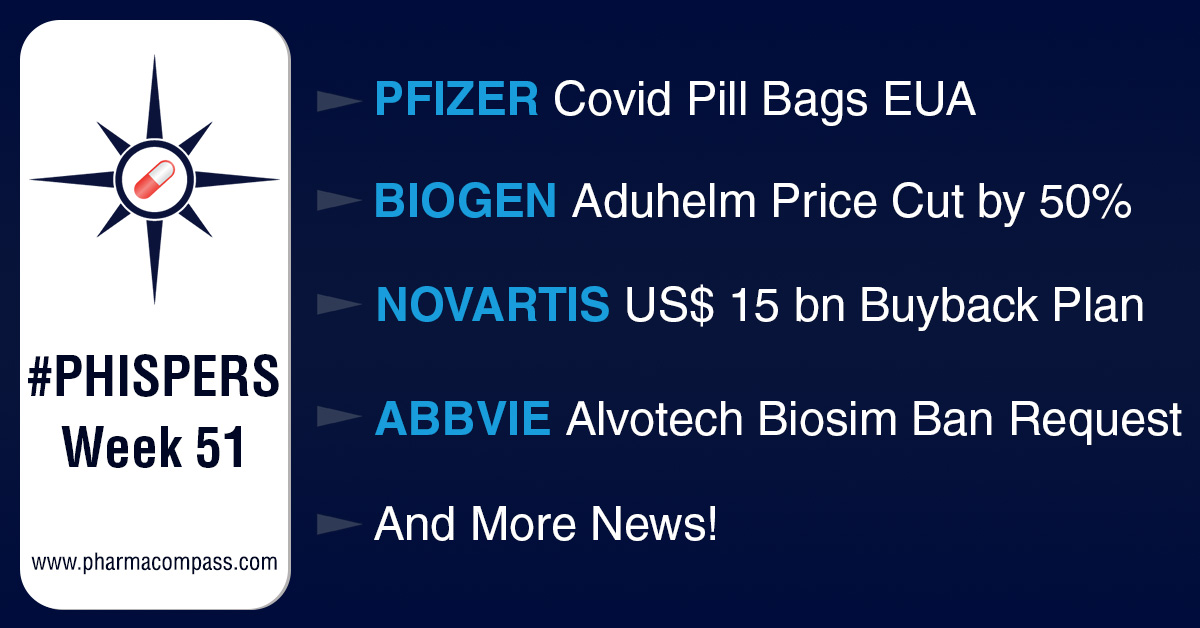
By PharmaCompass
2021-12-23
Impressions: 1781
In this week’s Phispers, we bring you updates on Biogen’s controversial Alzheimer’s drug, Novartis’ plans with the US$ 20.7 billion earned through last month’s Roche stake sale and news on M&A deals, FDA approvals and Covid-19.
In Covid news, Pfizer’s antiviral drug Paxlovid bagged authorization in the US and is being seen as a powerful tool against the fast-spreading Omicron variant. The drugmaker also announced plans to test three reduced doses of its Covid-19 vaccine in children between the ages of two and four years. And Novavax received EMA’s approval to supply its Covid-19 vaccine to EU’s 27 member states.
Biogen reduced the price of its Alzheimer’s drug Aduhelm by 50 percent three weeks before the crucial meet that will discuss the drug’s inclusion into America’s Medicare insurance program. The company also plans to launch phase 4 trials of the drug next year.
Flush with cash it received by selling Roche shares last month, Novartis announced a US$ 15 billion share buyback plan. It also acquired UK-based Gyroscope Therapeutics for US$ 1.5 billion and signed a US$ 1 billion biobucks deal with BeiGene for a cancer drug. In other M&A news, Sanofi bought US cancer firm Amunix for US$ 1 billion in cash.
Meanwhile, AbbVie moved the US International Trade Commission in order to prevent Alvotech from selling a biosimilar of its blockbuster rheumatoid arthritis drug, Humira.
The FDA approved GlaxoSmithKline’s Apretude as an injectable medicine to protect against HIV. The agency placed on hold a clinical trial of Pfizer’s gene therapy treatment for Duchenne muscular dystrophy following the death of a young male patient.
Pfizer’s oral Covid drug bags authorization in US; Novavax bags EMA’s EUA for its jab
In Covid updates, there is news that the United States has authorized Paxlovid, Pfizer's oral Covid-19 treatment for those aged 12 years or more. This is the first oral and at-home treatment for Covid-19, and is being seen as a tool to control the fast-spreading Omicron variant.
In clinical trials, Paxlovid was nearly 90 percent effective in preventing hospitalizations and deaths in patients at high risk of severe illness and recent lab data suggests the drug retains its effectiveness against Omicron.
Meanwhile, the New York-headquartered drugmaker has announced plans to test three reduced doses of its Covid-19 vaccine in children between the ages of two and four years, instead of the usual two-dose course. It decided to add an extra dose after a preliminary analysis found that children in that age group didn’t develop a strong immune response post administration of two special low-dose shots. Pfizer said if the three-dose study is successful, it plans to apply for emergency authorization in the first half of 2022.
Novavax’s Covid vaccine bags EMA’s EUA: In a boost to US biotech Novavax, the European drug regulator on Monday authorized the use of its Covid-19 vaccine in people 18 years and above, paving the way for a fifth shot in the EU. Data from two large studies showed that the two-dose vaccine, branded Nuvaxovid, has an efficacy of around 90 percent, the European Medicines Agency (EMA) said.
Novavax said it would start shipping vaccines to the EU in January as part of its deal to supply up to 200 million doses. Member states have ordered around 27 million doses for the first quarter, the EMA said. It is not clear if two-doses of Novavax are effective against the Omicron variant. Novavax said it plans to file for US authorization within 10 days.
Meanwhile, Moderna said a booster dose of its coronavirus vaccine appeared to be protective against the Omicron variant in laboratory testing. Earlier, a study had found the initial two-shot regimen to be less effective at neutralizing Omicron. The biotech said it still plans to develop an Omicron-specific vaccine and start clinical trials early next year.
AstraZeneca also said it is working with Oxford University to produce a vaccine for the Omicron coronavirus variant. Last week, a lab study had found that Astra’s antibody cocktail Evusheld neutralizes the Omicron variant.
Biogen slashes price of its Alzheimer’s drug by half, weeks before CMS’ Medicare meet
Since June this year, when the US Food and Drug Administration (FDA) approved Biogen's Aduhelm (aducanumab) – the first drug to treat Alzheimer’s disease – we have read several controversies surrounding this approval. For instance, several doctors said they don’t feel comfortable prescribing aducanumab and members of the FDA advisory committee resigned in protest over the approval. In fact, soon after the approval, the US Department of Health and Human Services had said it would investigate the drug’s accelerated approval due to some allegations concerning the FDA.
The drug continues to face pushback. Last week, the European Medicines Agency (EMA) announced it has recommended that the European Commission reject Aduhelm. This deals a severe blow to Biogen’s hopes of finding a large market for Aduhelm. The agency cited “conflicting” results from two phase 3 clinical trials along with its known side effects — which includes brain swelling and bleeding — while rejecting Aduhelm.
Moreover, a panel review of aducanumab also earned a pushback from the health ministry in Japan due to inconsistent phase 3 data and lack of clinical significance in reducing amyloid plaque in patients.
In the US, awaiting a Medicare coverage decision and facing a slower-than-expected growth, Biogen on Monday slashed the price of its controversial Alzheimer’s drug by half — from US$ 56,000 to US$ 28,200. The new prices will be effective from January 1, 2022.
Biogen’s decision comes just three weeks before a crucial meeting called by the Centers for Medicare & Medicaid Services (CMS) to discuss the drug’s inclusion in Medicare. CMS had earlier projected a 15 percent rise in Medicare Part B premiums in 2022, citing the potential inclusion of Aduhelm as the main reason for the increase.
Biogen hopes the lower price tag might persuade insurers and Medicare to cover the cost of the drug. With insurance coverage and access to diagnostics and specialized centers, the drugmaker believes around 50,000 patients may begin treatment with Aduhelm in 2022.
While announcing the price cut, the company said it would institute “cost-reduction measures” in 2022 to save around US$ 500 million. The measures may include 11 percent reduction in total workforce – i.e. over 1,000 employees could lose their jobs in 2022. Once implemented, this would be the largest round of layoffs in the company’s 43-year history.
Drug pricing activists said Aduhelm’s reduced price is still significantly higher than expected. While prominent US drug pricing watchdog Institute for Clinical and Economic Review (ICER) pegged the price of the drug between US$ 3,000 to US$ 8,400 per year, some analysts want the price to be capped at US$ 10,000 per year.
Meanwhile, a group of Alzheimer’s disease researchers and medical professors from Harvard and Johns Hopkins have asked the FDA to quickly pull the drug out of the market, adding that the drug has proved to be ineffective in previous trials.
Between July and August this year, Biogen generated just US$ 300,000 from Aduhelm sales, indicating that less than 100 Alzheimer’s patients have received the drug so far.
Drugmaker to launch phase 4 trial in 2022: Biogen has announced its plans to launch a global study (i.e. a confirmatory/phase 4 trial) to evaluate Aduhelm in May 2022 as mandated by the FDA, adding that it plans to recruit more than 1,300 patients with early Alzheimer's disease. Reports from the data is expected in 2026.
With Roche cash in hand, Novartis announces US$ 15 billion share buyback plan, buys Gyroscope for US$ 1.5 billion
When Novartis decided to offload its stake in Roche for US$ 20.7 billion last month, investors were expecting the cash-rich drugmaker to use the bounty for acquisitions. Last week, the Swiss biotech took a multi-pronged approach to use up the cash. It announced a US$ 15 billion share buyback plan, acquired a gene therapy firm – Gyroscope – for US$ 1.5 billion and signed a billion-dollar deal with BeiGene for an anti-cancer drug.
Announcing the buyback scheme, Novartis said it signals the company’s confidence in its own growth prospects and in its pipeline, adding that it can complete the buyback “without compromising the company’s capacity for value-creating bolt-on M&A.” Novartis plans to execute the buyback by 2023.
The pharma giant also acquired UK-based Gyroscope Therapeutics for US$ 1.5 billion as part of its plan to boost its gene therapy pipeline. Gyroscope’s parent company, London-listed healthcare investment firm Syncona, said Novartis will pay US$ 800 million in cash and up to US$ 700 million in additional milestone payments.
The acquisition will add an investigational, one-time gene therapy for the treatment of people living with geographic atrophy — a leading cause of blindness with no approved treatment — to Novartis’ portfolio. The therapy, GT005, is currently in phase 2 clinical trials. Gyroscope also has several other retinal diseases-related assets in its pipeline.
Moreover, Novartis also signed a US$ 1 billion deal with BeiGene to collaborate and develop an anti-cancer therapy – ociperlimab. As part of the deal, Novartis will make an upfront payment of US$ 300 million and pay up to US$ 700 million in milestone payments. BeiGene is testing ociperlimab in two phase 3 trials in combination with tislelizumab, an antibody already approved in China. All the milestones in the deal are contingent on Novartis optioning ociperlimab by 2023.
BMS unveils US$ 15 billion share buyback plan: New York-based pharma giant Bristol Myers Squibb (BMS) unveiled its plans to repurchase an additional US$ 15 billion of the company’s common stock. The timing and amount of any share purchases will be determined by the management, and the buyback could be suspended or discontinued at any time, the company said in a statement.
Sanofi acquires cancer firm Amunix Pharmaceuticals for US$ 1 billion
Pharma giant Sanofi on Tuesday said it will buy California-based Amunix Pharmaceuticals for US$ 1 billion in cash, marking another attempt by the French drugmaker to revive its pipeline and to overcome its setbacks in the race for Covid-19 vaccines. Sanofi will also pay Amunix up to US$ 225 million based on certain future development milestones.
Immuno-oncology firm Amunix is developing cancer therapies based on small proteins called cytokines and T-cells, a type of white blood cell. Its most promising candidate medicine, AMX-818, is expected to go to clinical trials early next year. Sanofi plans to complete the acquisition in the first quarter of 2022.
The acquisition supports Sanofi’s efforts to accelerate and expand its oncology division, which currently has around 20 molecules in the developmental stage. According to Sanofi’s research and development chief John Reed, Amunix’s technology could “precisely tailor-deliver medicines to become active only in tumor tissues while sparing normal tissues.”
AbbVie moves International Trade Commission to ban Alvotech’s Humira biosimilar
After a US district court dismissed its trade secrets case against Alvotech for lack of jurisdiction in October this year, AbbVie has filed a complaint with the US International Trade Commission to prevent the former from selling a lower cost version of its blockbuster rheumatoid arthritis drug, Humira.
AbbVie claims that Alvotech’s biosimilar for Humira (adalimumab) was developed with trade secrets stolen by its former employees who went on to work for Alvotech. It has asked the Commission to permanently ban Alvotech from doing anything with the biosimilar in the US. Rejecting its rival’s arguments, Alvotech has claimed that its version of the drug is the first-filed copycat equal in strength to Humira’s latest formulation.
Humira brought in more than US$ 19.8 billion in revenue for AbbVie last year, accounting for more than 40 percent of its total revenue. In the US, Amgen will kick off the Humira biosimilar spree on January 31, 2023. Boehringer Ingelheim and Pfizer will launch their versions on July 1, 2023, and November 20, 2023, respectively.
GSK’s HIV prevention injection gets FDA nod; to challenge Gilead’s drugs
The US Food and Drug Administration (FDA) has approved British pharma giant GlaxoSmithKline’s Apretude (cabotegravir) as a long-acting, injectable medicine to protect against HIV in adults and adolescents considered at risk of contracting the virus. FDA’s endorsement is the first such long-acting option for pre-exposure prophylaxis (PrEP).
Apretude is initially administered as two shots one month apart, and then once every two months. It will challenge Gilead’s well-established daily pills Truvada, its generic and Descovy. The agency approved Apretude after the drug showed stellar efficacy in two phase 3 trials, topping Truvada in both men and women at preventing HIV infections.
The injection will be available at the wholesale acquisition cost of US$ 3,700 per vial. Given its bimonthly dosing, it would cost almost the same as branded oral PrEP options.
Meanwhile, the FDA has placed a clinical hold on the use of Gilead’s injectable lenacapavir in borosilicate vials in all ongoing clinical studies for HIV treatment and HIV pre-exposure prophylaxis (PrEP). “The FDA’s clinical hold is due to emerging concerns about the compatibility of vials made of borosilicate glass with lenacapavir solution, which could potentially lead to the formation of sub-visible glass particles in the solution of lenacapavir,” Gilead said in a statement.
FDA puts Pfizer’s gene therapy drug on clinical hold after patient’s death
The US Food and Drug Administration (FDA) has placed on clinical hold Pfizer’s gene therapy to treat Duchenne muscular dystrophy (DMD) following the death of a young male patient who was participating in the phase 1 trials.
Announcing the death, Pfizer said it has incomplete information but is “actively working with the trial site investigator” to find out the reason. The biotech has paused screening and dosing in the study following the FDA hold. DMD is an inherited disease that leads to loss of mobility and early death.
Meanwhile, authorities in New Zealand said a 26-year-old man died from myocarditis, a rare inflammation of the heart muscle, after taking the first dose of Pfizer’s Covid-19 vaccine. Pfizer said it is aware of the death.
The PharmaCompass Newsletter – Sign Up, Stay Ahead
Feedback, help us to improve. Click here
Image Credit : Phisper Infographic by SCORR MARKETING & PharmaCompass is licensed under CC BY 2.0
“ The article is based on the information available in public and which the author believes to be true. The author is not disseminating any information, which the author believes or knows, is confidential or in conflict with the privacy of any person. The views expressed or information supplied through this article is mere opinion and observation of the author. The author does not intend to defame, insult or, cause loss or damage to anyone, in any manner, through this article.”








